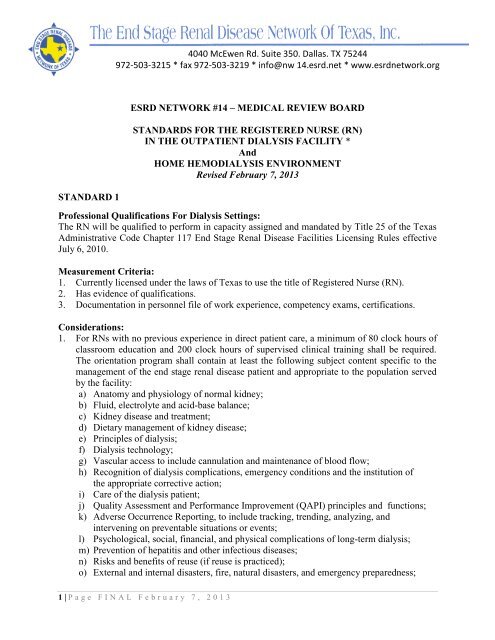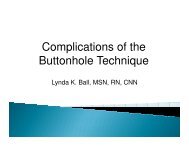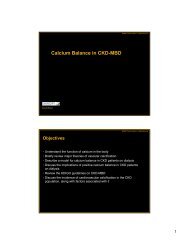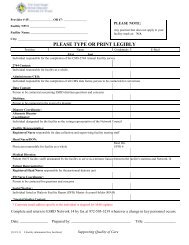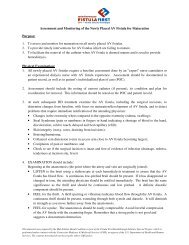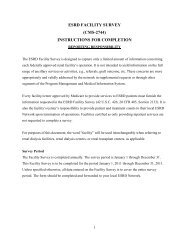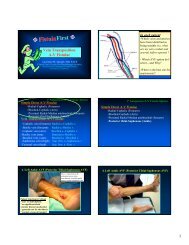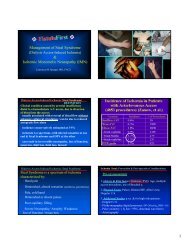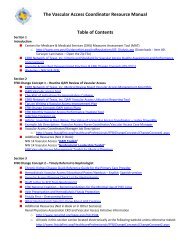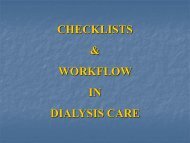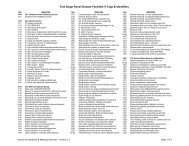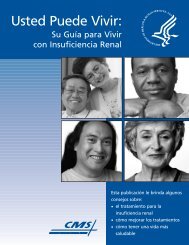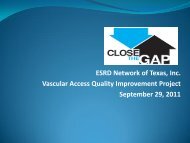esrd network #14 â medical review board - The End Stage Renal ...
esrd network #14 â medical review board - The End Stage Renal ...
esrd network #14 â medical review board - The End Stage Renal ...
- No tags were found...
Create successful ePaper yourself
Turn your PDF publications into a flip-book with our unique Google optimized e-Paper software.
4040 McEwen Rd. Suite 350. Dallas. TX 75244972-503-3215 * fax 972-503-3219 * info@nw 14.<strong>esrd</strong>.net * www.<strong>esrd</strong><strong>network</strong>.orgSTANDARD 1ESRD NETWORK <strong>#14</strong> – MEDICAL REVIEW BOARDSTANDARDS FOR THE REGISTERED NURSE (RN)IN THE OUTPATIENT DIALYSIS FACILITY *AndHOME HEMODIALYSIS ENVIRONMENTRevised February 7, 2013Professional Qualifications For Dialysis Settings:<strong>The</strong> RN will be qualified to perform in capacity assigned and mandated by Title 25 of the TexasAdministrative Code Chapter 117 <strong>End</strong> <strong>Stage</strong> <strong>Renal</strong> Disease Facilities Licensing Rules effectiveJuly 6, 2010.Measurement Criteria:1. Currently licensed under the laws of Texas to use the title of Registered Nurse (RN).2. Has evidence of qualifications.3. Documentation in personnel file of work experience, competency exams, certifications.Considerations:1. For RNs with no previous experience in direct patient care, a minimum of 80 clock hours ofclassroom education and 200 clock hours of supervised clinical training shall be required.<strong>The</strong> orientation program shall contain at least the following subject content specific to themanagement of the end stage renal disease patient and appropriate to the population servedby the facility:a) Anatomy and physiology of normal kidney;b) Fluid, electrolyte and acid-base balance;c) Kidney disease and treatment;d) Dietary management of kidney disease;e) Principles of dialysis;f) Dialysis technology;g) Vascular access to include cannulation and maintenance of blood flow;h) Recognition of dialysis complications, emergency conditions and the institution ofthe appropriate corrective action;i) Care of the dialysis patient;j) Quality Assessment and Performance Improvement (QAPI) principles and functions;k) Adverse Occurrence Reporting, to include tracking, trending, analyzing, andintervening on preventable situations or events;l) Psychological, social, financial, and physical complications of long-term dialysis;m) Prevention of hepatitis and other infectious diseases;n) Risks and benefits of reuse (if reuse is practiced);o) External and internal disasters, fire, natural disasters, and emergency preparedness;1 | P a g e F I N A L F e b r u a r y 7 , 2 0 1 3
4040 McEwen Rd. Suite 350. Dallas. TX 75244972-503-3215 * fax 972-503-3219 * info@nw 14.<strong>esrd</strong>.net * www.<strong>esrd</strong><strong>network</strong>.orgp) Safety, quality control, and continuous quality improvement;q) Dialysate composition, options, indications, complications, and safety.2. <strong>The</strong> RN shall demonstrate competency through written and skills testing annually. Evidenceof competency shall be documented in writing and maintained in personnel files.3. An RN shall maintain documentation to demonstrate that she/he completes at least fivehours of continuing education related to end stage renal disease annually.STANDARD 2RN Working In <strong>The</strong> Charge Nurse Role:<strong>The</strong> RN will be qualified to perform in capacity assigned and mandated by Title 25 of the TexasAdministrative Code Chapter 117 <strong>End</strong> <strong>Stage</strong> <strong>Renal</strong> Disease Facilities Licensing Rules effectiveJuly 6, 2010.Measurement Criteria:1. Documentation of required work experience and or certifications.2. Has evidence of qualifications.3. Documentation in personnel file of work experience, competency exams, certifications.Considerations:1. An RN assigned charge responsibilities shall have shall have at least 12 months of clinicalexperience and six months experience in the modality, obtained within the last 24 months.An RN who holds a current certification from a nationally recognized <strong>board</strong> in nephrologynursing or hemodialysis may substitute the certification for the six months experience indialysis obtained within the last 24 months. Responsibilities of an RN functioning as acharge nurse shall include, but are not limited to:a) Making assignments based on patient needs;b) Providing immediate supervision of direct patient care;c) Making patient assessments when indicated;d) Communicating with the physician(s), social worker(s), dietitian(s) and technician(s).2. If an RN instructs patient and family members on self-dialysis training, the RN must haveleast 12 months experience in dialysis and experience in the applicable dialysis modality(hemodialysis, home hemodialysis or peritoneal dialysis). When other personnel assist inthe training, supervision by the registered nurse shall be demonstrated.3. A RN functioning in the charge role shall be on site and available to the treatment area toprovide patient care during all dialysis treatments.STANDARD 3RN Staffing Levels:2 | P a g e F I N A L F e b r u a r y 7 , 2 0 1 3
4040 McEwen Rd. Suite 350. Dallas. TX 75244972-503-3215 * fax 972-503-3219 * info@nw 14.<strong>esrd</strong>.net * www.<strong>esrd</strong><strong>network</strong>.org<strong>The</strong> RN will be qualified to perform in capacity assigned and mandated by Title 25 of the TexasAdministrative Code Chapter 117 <strong>End</strong> <strong>Stage</strong> <strong>Renal</strong> Disease Facilities Licensing Rules effectiveJuly 6, 2010.Measurement Criteria1. Documentation of required work experience.2. Staff work roster.3. Documentation in personnel file of work experience, competency exams, certifications.Considerations:1. At least one licensed nurse shall be available on-site to provide patient care for every twelvepatients or portion thereof. This may include the nurse functioning in charge role.2. <strong>The</strong> staffing level for a facility shall not exceed four patients per licensed nurse or patientcare technician per patient shift. During treatment of eight or more patients, the licensednurse functioning in the charge role shall not be included in this ratio. Additional staff to beprovided based on acuity.3. If the catheter rate for a facility shift exceeds 40%, then the licensed nurse to patient ratiofor that shift should be re-evaluated and re-adjusted to a ratio of no more than 6 patients toone licensed nurse to provide optimal patient safety during that shift.4. If pediatric dialysis (18 years of age or younger) is provided, an RN with experience ortraining in pediatric dialysis shall be available to provide care for pediatric dialysis patientsyounger than 14 years of age or smaller than 35 kilograms in weight.5. For pediatric dialysis patients, one licensed nurse shall be provided on-site for each patientweighing less than ten kilograms and one licensed nurse provided on- site for every twopatients weighing from ten to 20 kilograms.6. Preferably, patients 12 years of age and younger should have an initial evaluation completedby a pediatric nephrologist prior to first dialysis. If a pediatric nephrologist is not availableas the primary physician, an adult nephrologist may serve as the primary physician withdirect patient evaluation by a pediatric nephrologist according to the following schedule:• For patients two years of age or younger – monthly (two of three evaluations may be byphone)• For patients three to 12 years of age – quarterly; and• For patients 13 to 18 years of age – semiannually.STANDARD 4RN Clinical and Supervisor Responsibilities:3 | P a g e F I N A L F e b r u a r y 7 , 2 0 1 3
4040 McEwen Rd. Suite 350. Dallas. TX 75244972-503-3215 * fax 972-503-3219 * info@nw 14.<strong>esrd</strong>.net * www.<strong>esrd</strong><strong>network</strong>.org<strong>The</strong> RN will be qualified to perform in the capacity assigned and mandated by Title 25 of theTexas Administrative Code Chapter 117 <strong>End</strong> <strong>Stage</strong> <strong>Renal</strong> Disease Facilities Licensing Ruleseffective July 6, 2010.Measurement Criteria:1. Documentation of required work experience.2. Documentation in personnel file of work experience, competency exams, certifications.Considerations:1. A registered nurse shall be responsible for: but is not limited to:a) Conducting admission nursing assessments, to include:Prior to first treatment in the facility, an initial assessment must be completed bythe RN.Requesting and charting prior to the patient’s first treatment in the facility, thepatient's diagnoses, medications, hepatitis status, allergies, vascular access anddialysis prescription.<strong>The</strong> patient plan of care shall be developed and implemented within 30 calendardays or 13 outpatient dialysis treatments from the patient’s admission to thefacility, 90 days after admission, monthly if patient is unstable if determined by theIDT, and annually. <strong>The</strong> plan of care shall be revised due to the patient’s lack ofprogress towards the goals of the plan of care, marked deterioration in healthstatus, significant changes in the patient’s psychosocial needs, or changes in thepatient’s nutritional condition, as needed but no less than annually after the date ofthe patient’s last plan of care.b) Documenting patient's condition and response to treatment on the daily treatmentrecord;c) Each patient’s clinical record, whether hard copy, electronic, or a combination of both,shall include complete and pertinent information about the condition of the patient,assessments by the interdisciplinary team, updated plans of care, all interventions andtreatments prescribed and delivered, and details of any events occurring with thepatient during the course of treatment;d) Conducting assessments of a patient when indicated by a question relating to a changein the patient's status or at the patient's or family’s request or upon return from ahospitalization;e) Participating in team <strong>review</strong> of a patient's progress; maintaining progress notes thatprovide an accurate picture of the progress of the patient, reflecting changes in patientstatus, plans for and results of changes in treatment, diagnostic testing, consultations,and unusual events. Registered nurses shall record the progress of the patient monthly.f) Recommending changes in treatment based on the patient's current needs;g) Facilitating communication between the patient, patient's family or significant other,and other team members to ensure needed care is delivered;h) Document in the patient’s <strong>medical</strong> record monthly and prn regarding patient education(topic).4 | P a g e F I N A L F e b r u a r y 7 , 2 0 1 3
4040 McEwen Rd. Suite 350. Dallas. TX 75244972-503-3215 * fax 972-503-3219 * info@nw 14.<strong>esrd</strong>.net * www.<strong>esrd</strong><strong>network</strong>.orgi) Participate with team to work with challenging patients;j) Patient, family and staff education and support;k) Providing information and resources on advance directives and/or other end-of-lifeissues as indicated;l) Completing clinical records within 30 days after discharge. <strong>The</strong> nursing dischargesummary shall clearly identify the disposition of the patient and include the diagnosisor cause of death, date of discharge or death, location of death, transplant or relocationinformation when appropriate, and reason for discharge if not transplantation or death;m) Coordinating dialysis treatments for transient patients, including obtaining andIncluding the following documentation, at a minimum:1. Orders for treatment in this facility;2. List of medications and allergies;3. Laboratory reports. Such reports shall indicate laboratory work was performedno later than one month prior to treatment at the facility and include screeningfor hepatitis B status;4. <strong>The</strong> most current patient plan of care;5. <strong>The</strong> three most current treatment records from the home facility;6. Records of care and treatment at this facility.n) Providing oversight and direction to dialysis technicians and licensed vocationalnurses;o) Participating in continuous quality improvement activities;p) Monitoring results of water treatment system;q) Ensuring compliance with facility’s infection control policies and procedures;r) Actively participate in emergency preparedness program to include EM System andawareness of TEEC.STANDARD 5Home Hemodialysis RN Responsibilities<strong>The</strong> RN will be qualified to perform in the capacity assigned and mandated by Title 25 of theTexas Administrative Code Chapter 117 <strong>End</strong> <strong>Stage</strong> <strong>Renal</strong> Disease Facilities Licensing Ruleseffective July 6, 2010.Measurement Criteria:1. Documentation of required work experience.2. A home hemodialysis registered nurse must have at least 12 months clinical experience andsix months experience in the specific modality with the responsibility for training the patient,and the patient’s caregiver.3. Documentation in personnel file of work experience, competency exams, certifications.5 | P a g e F I N A L F e b r u a r y 7 , 2 0 1 3
4040 McEwen Rd. Suite 350. Dallas. TX 75244972-503-3215 * fax 972-503-3219 * info@nw 14.<strong>esrd</strong>.net * www.<strong>esrd</strong><strong>network</strong>.orgConsiderations:1. A registered nurse shall be responsible for but is not limited to:a) Conducting an assessment for each home dialysis patient and address the specific needsof the patient, in the nature and management of end stage renal disease;b) Include the full range of techniques associated with the treatment modality selected,including effective use of dialysis supplies and equipment in achieving and delivering thephysician’s prescription;c) Training of the patient, and/or caregiver regarding the effective, and safe administrationof erythropoiesis-stimulating agent(s) (if prescribed) to achieve and maintain a targetlevel hemoglobin, hematocrit, and blood pressure levels, or hematocrit as written in thepatient’s plan of care;d) Training of the patient, and/or caregiver how to detect, report, and manage potentialdialysis complications, including water treatment problems;e) Training of the patient, and/or caregiver regarding the availability of support resourcesand how to access and use resources;f) Training of the patient, and/or caregiver how to self-monitor health status and record andreport health status information;g) Training of the patient, and/or caregiver how to handle <strong>medical</strong> and non<strong>medical</strong>emergencies;h) Training of the patient, and/or caregiver regarding infection control precautions;i) Training of the patient, and/or caregiver regarding proper waste storage and disposalprocedures;j) Training of the patient, and/or caregiver how to order supplies on an ongoing basis;k) Training of the patient, and/or caregiver that non-<strong>medical</strong> electrical equipment shall notbe used within 6 feet of the home hemodialysis machine; andl) Maintain the documentation in the clinical record that the patient, the caregiver, or bothreceived and demonstrated adequate comprehension of the training.2. <strong>The</strong> registered nurse as part of the interdisciplinary team shall oversee training of the homedialysis patient and the designated caregiver before the initiation of home dialysis, and whenthe home dialysis caregiver or home dialysis modality changes.3. <strong>The</strong> initial monitoring visit of the patient’s home adaptation, including visits to the patient’shome by facility personnel (including, but not limited to, the registered nurse responsible fortraining the patient in the chosen modality and technical staff as appropriate) in accordancewith the patient’s plan of care, and no less than annually thereafter.4. <strong>The</strong> development and periodic <strong>review</strong> of the patient’s individualized comprehensive plan ofcare that specifies the services necessary to address the patient’s needs and meets themeasurable and expected outcomes.* <strong>The</strong> ESRD Network of Texas, Inc., STANDARDS FOR THE REGISTERED NURSE(RN) IN THE OUTPATIENT DIALYSIS FACILITY and HOME HEMODIALYSISENVIRONMENT, recommends adherence to the professional practices and processesdescribed in the American Nephrology Nurses Association’s 2011 Nephrology NursingScope and Standards of Practice 7 th Edition.6 | P a g e F I N A L F e b r u a r y 7 , 2 0 1 3


